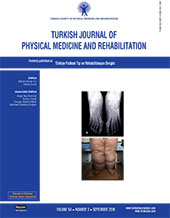Falls, fear of falling, and associated factors in ambulatory patients with rheumatoid arthritis: A comparative study with healthy controls
2 Department of Biostatistics, Medicine Faculty of Ondokuz Mayıs University, Samsun, Turkey DOI : 10.5606/tftrd.2018.1687 Objectives: This study aims to compare fall history and fear of falling (FOF) in patients with rheumatoid arthritis (RA) and healthy controls and to evaluate associated factors for fall risk and FOF in patients with RA.
Materials and methods: Between March 2016 and July 2016, a total of 120 patients with RA and 60 age- and sex-matched healthy volunteers were included in the study. The presence of FOF (Yes/No), fall history, and the number of falls within the past 12 month were questioned. All participants were assessed with the Falls Efficacy Scale-International (FES-I), 10 Meter Walk Test (10MWT), One-Leg Stand Test (OLST), Berg Balance Scale (BBS), Beck Depression Inventory (BDI), and Beck Anxiety Inventory (BAI). Pain Severity and Patient Global Assessment (PGA) by Visual Analog Scale (VAS), disability by the Health Assessment Questionnaire (HAQ), and disease activity by Disease Activity Score in 28 joints (DAS28) were evaluated in patients with RA.
Results: There was no statistically difference between the RA patients and healthy controls in terms of presence of fall history, while the presence of FOF and FES-I scores were significantly higher in the RA patients (p<0.05). In the patient group, the FES-I score was positively correlated with pain VAS, PGA, DAS-28, HAQ, BAI, BDI, and 10MWT and negatively BBS and OLST (p<0.05). The number of falls, HAQ, BBS, and BDI scores were found to be significant independent risk factors affecting variations in the FES-I scores (p<0.001).
Conclusion: Fear of falling seems to be an important problem in patients with RA, and patients without fall history may also have FOF. The most important factors associated with FOF were impaired balance, increased disability and depression, and number of falls in RA patients. Strategies for preventing falls, maintaining balance, improving emotional status and against FOF are of utmost importance in patients with RA.
Keywords : Balance; depression; falls; fear of falling; rheumatoid arthritis

















